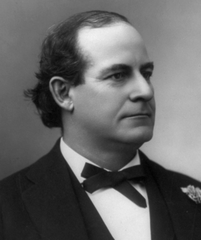
How would the creationism-evolution controversy have been different if World War I had never happened? Today the question is answered by George E. Webb, Professor of History at Tennessee Tech University and the author of The Evolution Controversy in America (Lexington [KY]: University Press of Kentucky, 1994).
On first glance, it is hard to imagine the antievolution campaign of the 1920s without the figure of William Jennings Bryan. By his own admission, Bryan was greatly influenced by the revelation that many German officials had embraced “Darwinism” (as Bryan perceived it) as the foundation for the militarism that had led to the Great War. He had read Vernon L. Kellogg’s Headquarters Nights and Benjamin Kidd’s The Science of Power, but had apparently missed the authors’ observations that these German leaders had misinterpreted Darwin’s work and had strangely merged “Darwinism” with the ideas of philosopher Friedrich Nietzsche. Bryan soon began writing essays and giving speeches with such titles as “The Menace of Darwinism” which caught the public’s attention and identified him as the leader of the crusade. By the time of the Scopes trial in 1925, Bryan had become the public face of the antievolution movement. Because German militarism and its supposed connection with Darwinism remained central in Bryan’s arguments until his death shortly after the Scopes trial, World War I clearly was necessary for this crucial component of the antievolution crusade.
 The absence of World War I might well have prevented Bryan from emerging as the crusade’s leader from another perspective, as well. Keep in mind that Bryan served as Woodrow Wilson’s Secretary of State until the summer of 1915. Admittedly, Bryan’s appointment had much more to do with the internal dynamics of the Democratic Party than the Great Commoner’s expertise in foreign policy. Nonetheless, the outbreak of the Great War had a profound effect on the Wilson administration’s views of world affairs. Embracing neutrality in 1914, the U.S. sought both to maintain its economic ties to the belligerents and to use its status as a world power to influence the warring parties to abandon their military actions. This latter hope reflected Wilson’s idealistic foreign policy which was shared by Bryan. And yet Wilson’s neutrality was more apparent than real. From the beginning, his sympathies remained with the allies (especially with Great Britain), a favoritism that strained the relationship with his Secretary of State, who took a much more literal view of neutrality than the president. When Wilson adopted a more confrontational stance toward Germany after the sinking of the Lusitania, Bryan viewed this as violating American neutrality and resigned from his post in June 1915. Had the war not broken out in 1914, it is likely that Bryan would have remained at State at least through the end of Wilson’s first term and, perhaps, during a second term as well (although the absence of World War I might well have had an intriguing impact on the 1916 presidential race). Bryan’s future role in American politics, following long service in the Department of State, might well be imagined, leaving him little time to consider Darwinism as a social or political issue.
The absence of World War I might well have prevented Bryan from emerging as the crusade’s leader from another perspective, as well. Keep in mind that Bryan served as Woodrow Wilson’s Secretary of State until the summer of 1915. Admittedly, Bryan’s appointment had much more to do with the internal dynamics of the Democratic Party than the Great Commoner’s expertise in foreign policy. Nonetheless, the outbreak of the Great War had a profound effect on the Wilson administration’s views of world affairs. Embracing neutrality in 1914, the U.S. sought both to maintain its economic ties to the belligerents and to use its status as a world power to influence the warring parties to abandon their military actions. This latter hope reflected Wilson’s idealistic foreign policy which was shared by Bryan. And yet Wilson’s neutrality was more apparent than real. From the beginning, his sympathies remained with the allies (especially with Great Britain), a favoritism that strained the relationship with his Secretary of State, who took a much more literal view of neutrality than the president. When Wilson adopted a more confrontational stance toward Germany after the sinking of the Lusitania, Bryan viewed this as violating American neutrality and resigned from his post in June 1915. Had the war not broken out in 1914, it is likely that Bryan would have remained at State at least through the end of Wilson’s first term and, perhaps, during a second term as well (although the absence of World War I might well have had an intriguing impact on the 1916 presidential race). Bryan’s future role in American politics, following long service in the Department of State, might well be imagined, leaving him little time to consider Darwinism as a social or political issue.
It remains, finally, to imagine an antievolution crusade without Bryan, a task of great difficulty. Although a few evangelical/Fundamentalist leaders suggested a connection between Darwinism and World War I in very vague terms, even before Bryan entered the fray, evolution was not a major Fundamentalist concern before Bryan’s entry. The twelve-volume publication, The Fundamentals (published between 1910 and 1915) all but ignored evolution as a central issue of the Fundamentalist cause. Of much greater concern were such topics as missionary activity, the defense of orthodox theology, evangelism, and the “higher criticism” of the Bible, the latter of which was viewed as an attack on traditional religion. The German scholars who had pioneered the higher criticism were viewed with special suspicion following the outbreak of war in 1914, which led some observers to link higher criticism with German militarism, with or without a similar connection with Darwinism. Once again, the absence of World War I would have made this linkage unlikely. More likely, absent the war, Fundamentalists would have remained only marginally interested in the place of Darwinism in public education, preferring instead to continue their focus on issues more directly related to their theological perspectives.
Without the figure of William Jennings Bryan, therefore, and with no compelling motive to embrace antievolution as a component of the Fundamentalist cause, the counterfactual history of the early 20th century without World War I would seem to leave little room for the creationist crusade that marked the century’s efforts to come to terms with Darwin. And without the impact on biology education associated with the Scopes Trial, it is at least conceivable that there would have been no need for the science education reform that led to BSCS materials that precipitated the creationist resurgence in the 1960s and later. For that matter, without World War I there might well not have been a World War II or the Cold War competition between the U.S. and the Soviet Union or the Sputnik crisis or … well, you get the idea. The world would no doubt be a very different place.
